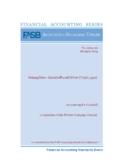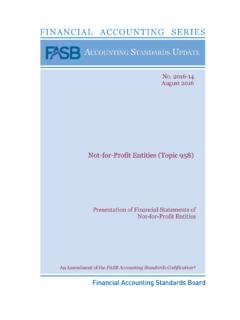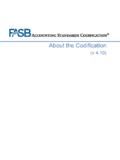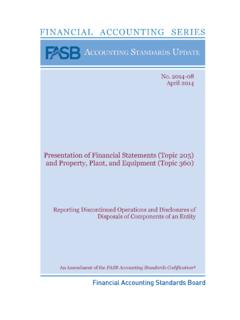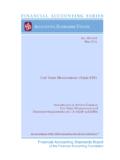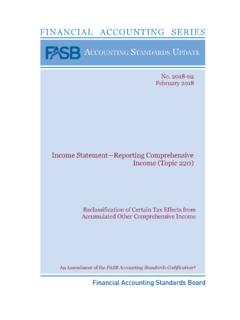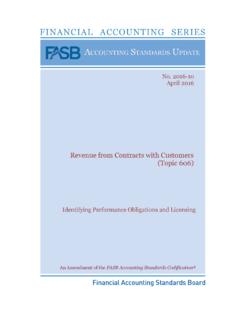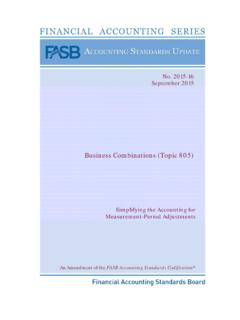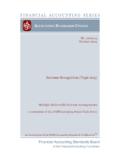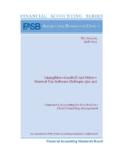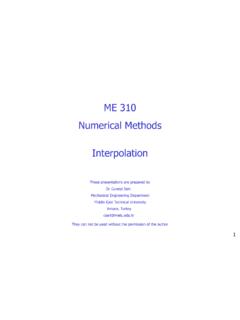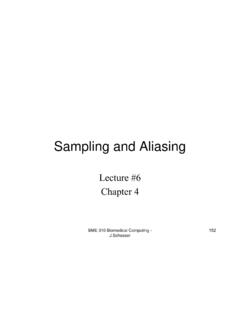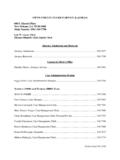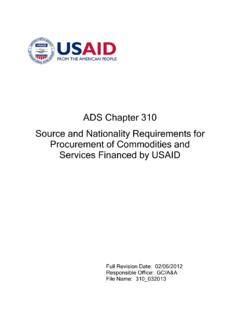Transcription of Receivables—Nonrefundable Fees and Other Costs (Subtopic ...
1 Receivables Nonrefundable Fees and Other Costs (Subtopic 310-20) No. 2017-08 March 2017 Premium Amortization on Purchased Callable Debt Securities An Amendment of the FASB Accounting Standards Codification The FASB Accounting Standards Codification is the source of authoritative generally accepted accounting principles (GAAP) recognized by the FASB to be applied by nongovernmental entities. An Accounting Standards Update is not authoritative; rather, it is a document that communicates how the Accounting Standards Codification is being amended. It also provides Other information to help a user of GAAP understand how and why GAAP is changing and when the changes will be effective. For additional copies of this Accounting Standards Update and information on applicable prices and discount rates contact: Order Department Financial Accounting Standards Board 401 Merritt 7 PO Box 5116 Norwalk, CT 06856-5116 Please ask for our Product Code No.
2 ASU2017-08. FINANCIAL ACCOUNTING SERIES (ISSN 0885-9051) is published monthly with the exception of July, September, and October by the Financial Accounting Foundation, 401 Merritt 7, PO Box 5116, Norwalk, CT 06856-5116. Periodicals postage paid at Norwalk, CT and at additional mailing offices. The full subscription rate is $255 per year. POSTMASTER: Send address changes to Financial Accounting Standards Board, 401 Merritt 7, PO Box 5116, Norwalk, CT 06856-5116. | No. 452 Copyright 2017 by Financial Accounting Foundation. All rights reserved. Content copyrighted by Financial Accounting Foundation may not be reproduced, stored in a retrieval system, or transmitted, in any form or by any means, electronic, mechanical, photocopying, recording, or otherwise, without the prior written permission of the Financial Accounting Foundation. Financial Accounting Foundation claims no copyright in any portion hereof that constitutes a work of the United States Government.
3 An Amendment of the FASB Accounting Standards Codification No. 2017-08 March 2017 Receivables Nonrefundable Fees and Other Costs (Subtopic 310-20) Premium Amortization on Purchased Callable Debt Securities Accounting Standards UpdateFinancial Accounting Standards Board Accounting Standards Update 2017-08 Receivables Nonrefundable Fees and Other Costs (Subtopic 310-20) Premium Amortization on Purchased Callable Debt Securities March 2017 CONTENTS Page Numbers Summary .. 1 2 Amendments to the FASB Accounting Standards Codification .. 3 8 Background Information and Basis for Conclusions .. 9 16 Amendments to the XBRL Taxonomy .. 17 1 Summary Why Is the FASB Issuing This Accounting Standards Update (Update)? The Board is issuing this Update to amend the amortization period for certain purchased callable debt securities held at a premium. The Board is shortening the amortization period for the premium to the earliest call date.
4 Under current generally accepted accounting principles (GAAP), entities generally amortize the premium as an adjustment of yield over the contractual life of the instrument. Stakeholders raised concerns that current GAAP excludes certain callable debt securities from consideration of early repayment of principal even if the holder is certain that the call will be exercised. As a result, upon the exercise of a call on a callable debt security held at a premium, the unamortized premium is recorded as a loss in earnings. Additionally, stakeholders told the Board that there is diversity in practice (1) in the amortization period for premiums of callable debt securities and (2) in how the potential for exercise of a call is factored into current impairment assessments. Stakeholders noted that generally, in the United States, callable debt securities are quoted, priced, and traded assuming a model that incorporates consideration of calls (also referred to as yield-to-worst pricing).
5 Financial statement users also told the Board that the amendment to the amortization period in this Update will provide more decision-useful information because it better aligns the amortization period of premiums and discounts to expectations incorporated in market pricing on the underlying securities. Who Is Affected by the Amendments in This Update? The amendments in this Update affect all entities that hold investments in callable debt securities that have an amortized cost basis in excess of the amount that is repayable by the issuer at the earliest call date (that is, at a premium). What Are the Main Provisions? The amendments in this Update shorten the amortization period for certain callable debt securities held at a premium. Specifically, the amendments require the premium to be amortized to the earliest call date. The amendments do not require an accounting change for securities held at a discount; the discount continues to be amortized to maturity.
6 2 How Do the Main Provisions Differ from Current Generally Accepted Accounting Principles (GAAP) and Why Are They an Improvement? Under current GAAP, premiums and discounts on callable debt securities generally are amortized to the maturity date. An entity must have a large number of similar loans to consider estimates of future principal prepayments when applying the interest method. However, an entity that holds an individual callable debt security at a premium may not amortize that premium to the earliest call date. If that callable debt security is subsequently called, the entity records a loss equal to the unamortized premium. The amendments in this Update more closely align the amortization period of premiums and discounts to expectations incorporated in market pricing on the underlying securities. In most cases, market participants price securities to the call date that produces the worst yield when the coupon is above current market rates (that is, the security is trading at a premium) and price securities to maturity when the coupon is below market rates (that is, the security is trading at a discount) in anticipation that the borrower will act in its economic best interest.
7 As a result, the amendments more closely align interest income recorded on bonds held at a premium or a discount with the economics of the underlying instrument. When Will the Amendments Be Effective? For public business entities, the amendments in this Update are effective for fiscal years, and interim periods within those fiscal years, beginning after December 15, 2018. For all Other entities, the amendments are effective for fiscal years beginning after December 15, 2019, and interim periods within fiscal years beginning after December 15, 2020. Early adoption is permitted, including adoption in an interim period. If an entity early adopts the amendments in an interim period, any adjustments should be reflected as of the beginning of the fiscal year that includes that interim period. An entity should apply the amendments in this Update on a modified retrospective basis through a cumulative-effect adjustment directly to retained earnings as of the beginning of the period of adoption.
8 Additionally, in the period of adoption, an entity should provide disclosures about a change in accounting principle. 3 Amendments to the FASB Accounting Standards Codification Introduction 1. The Accounting Standards Codification is amended as described in paragraphs 2 8. In some cases, to put the change in context, not only are the amended paragraphs shown but also the preceding and following paragraphs. Terms from the Master Glossary are in bold type. Added text is underlined, and deleted text is struck out. Amendments to Subtopic 310-20 2. Amend paragraph 310-20-35-33, with a link to transition paragraph 310-20-65-1, as follows: [Note: The definition of the term Debt Security is shown for convenience.] Debt Security Any security representing a creditor relationship with an entity. The term debt security also includes all of the following: a. Preferred stock that by its terms either must be redeemed by the issuing entity or is redeemable at the option of the investor b.
9 A collateralized mortgage obligation (or Other instrument) that is issued in equity form but is required to be accounted for as a nonequity instrument regardless of how that instrument is classified (that is, whether equity or debt) in the issuer s statement of financial position c. Treasury securities d. government agency securities e. Municipal securities f. Corporate bonds g. Convertible debt h. Commercial paper i. All securitized debt instruments, such as collateralized mortgage obligations and real estate mortgage investment conduits j. Interest-only and principal-only strips. The term debt security excludes all of the following: a. Option contracts b. Financial futures contracts c. Forward contracts d. Lease contracts 4 e. Receivables that do not meet the definition of security and, so, are not debt securities, for example: 1.
10 Trade accounts receivable arising from sales on credit by industrial or commercial entities 2. Loans receivable arising from consumer, commercial, and real estate lending activities of financial institutions. Receivables Nonrefundable Fees and Other Costs Subsequent Measurement > Estimating Principal Prepayments 310-20-35-33 Assuming that an entity purchasesTo the extent that the amortized cost basis of an individual callable debt securitybond at a premium exceeds the amount repayable by the issuer at the earliest call date, the excess (that is, the premium) shallmay not be amortized to the earliest call date, unless the guidance in paragraph 310-20-35-26 is applied to consider estimated prepayments. After the earliest call date, if the call option is not exercised, the entity shall reset the effective yield using the payment terms of the debt security. Securities within the scope of this paragraph are those that have explicit, noncontingent call features that are callable at fixed prices and on preset dates.
